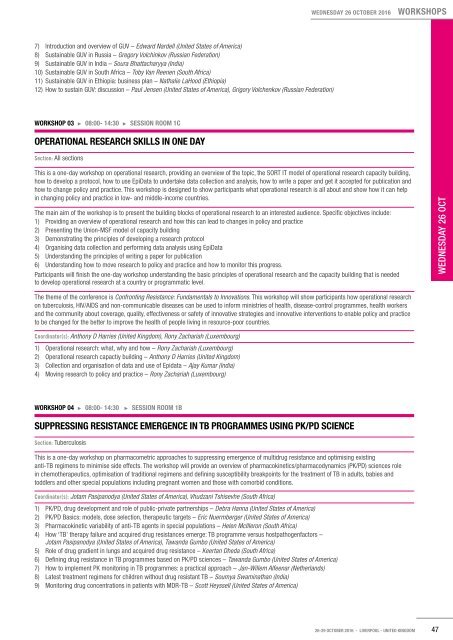TO INNOVATIONS
2f3gIP7
2f3gIP7
Create successful ePaper yourself
Turn your PDF publications into a flip-book with our unique Google optimized e-Paper software.
WEDNESDAY 26 OC<strong>TO</strong>BER 2016 WORKSHOPS<br />
7) Introduction and overview of GUV – Edward Nardell (United States of America)<br />
8) Sustainable GUV in Russia – Gregory Volchinkov (Russian Federation)<br />
9) Sustainable GUV in India – Soura Bhattacharyya (India)<br />
10) Sustainable GUV in South Africa – Toby Van Reenen (South Africa)<br />
11) Sustainable GUV in Ethiopia: business plan – Nathalie LaHood (Ethiopia)<br />
12) How to sustain GUV: discussion – Paul Jensen (United States of America), Grigory Volchenkov (Russian Federation)<br />
WORKSHOP 03 3 08:00- 14:30 3 SESSION ROOM 1C<br />
OPERATIONAL RESEARCH SKILLS IN ONE DAY<br />
Section: All sections<br />
This is a one-day workshop on operational research, providing an overview of the topic, the SORT IT model of operational research capacity building,<br />
how to develop a protocol, how to use EpiData to undertake data collection and analysis, how to write a paper and get it accepted for publication and<br />
how to change policy and practice. This workshop is designed to show participants what operational research is all about and show how it can help<br />
in changing policy and practice in low- and middle-income countries.<br />
The main aim of the workshop is to present the building blocks of operational research to an interested audience. Specific objectives include:<br />
1) Providing an overview of operational research and how this can lead to changes in policy and practice<br />
2) Presenting the Union-MSF model of capacity building<br />
3) Demonstrating the principles of developing a research protocol<br />
4) Organising data collection and performing data analysis using EpiData<br />
5) Understanding the principles of writing a paper for publication<br />
6) Understanding how to move research to policy and practice and how to monitor this progress.<br />
Participants will finish the one-day workshop understanding the basic principles of operational research and the capacity building that is needed<br />
to develop operational research at a country or programmatic level.<br />
WEDNESDAY 26 OCT<br />
The theme of the conference is Confronting Resistance: Fundamentals to Innovations. This workshop will show participants how operational research<br />
on tuberculosis, HIV/AIDS and non-communicable diseases can be used to inform ministries of health, disease-control programmes, health workers<br />
and the community about coverage, quality, effectiveness or safety of innovative strategies and innovative interventions to enable policy and practice<br />
to be changed for the better to improve the health of people living in resource-poor countries.<br />
Coordinator(s): Anthony D Harries (United Kingdom), Rony Zachariah (Luxembourg)<br />
1) Operational research: what, why and how – Rony Zachariah (Luxembourg)<br />
2) Operational research capactiy building – Anthony D Harries (United Kingdom)<br />
3) Collection and organisation of data and use of Epidata – Ajay Kumar (India)<br />
4) Moving research to policy and practice – Rony Zachariah (Luxembourg)<br />
WORKSHOP 04 3 08:00- 14:30 3 SESSION ROOM 1B<br />
SUPPRESSING RESISTANCE EMERGENCE IN TB PROGRAMMES USING PK/PD SCIENCE<br />
Section: Tuberculosis<br />
This is a one-day workshop on pharmacometric approaches to suppressing emergence of multidrug resistance and optimising existing<br />
anti-TB regimens to minimise side effects. The workshop will provide an overview of pharmacokinetics/pharmacodynamics (PK/PD) sciences role<br />
in chemotherapeutics, optimisation of traditional regimens and defining susceptibility breakpoints for the treatment of TB in adults, babies and<br />
toddlers and other special populations including pregnant women and those with comorbid conditions.<br />
Coordinator(s): Jotam Pasipanodya (United States of America), Vhudzani Tshisevhe (South Africa)<br />
1) PK/PD, drug development and role of public-private partnerships – Debra Hanna (United States of America)<br />
2) PK/PD Basics: models, dose selection, therapeutic targets – Eric Nuermberger (United States of America)<br />
3) Pharmacokinetic variability of anti-TB agents in special populations – Helen McIlleron (South Africa)<br />
4) How ‘TB’ therapy failure and acquired drug resistances emerge: TB programme versus hostpathogenfactors –<br />
Jotam Pasipanodya (United States of America), Tawanda Gumbo (United States of America)<br />
5) Role of drug gradient in lungs and acquired drug resistance – Keertan Dheda (South Africa)<br />
6) Defining drug resistance in TB programmes based on PK/PD sciences – Tawanda Gumbo (United States of America)<br />
7) How to implement PK monitoring in TB programmes: a practical approach – Jan-Willem Alfeenar (Netherlands)<br />
8) Latest treatment regimens for children without drug resistant TB – Soumya Swaminathan (India)<br />
9) Monitoring drug concentrations in patients with MDR-TB – Scott Heyssell (United States of America)<br />
26-29 OC<strong>TO</strong>BER 2016 - LIVERPOOL - UNITED KINGDOM<br />
47


